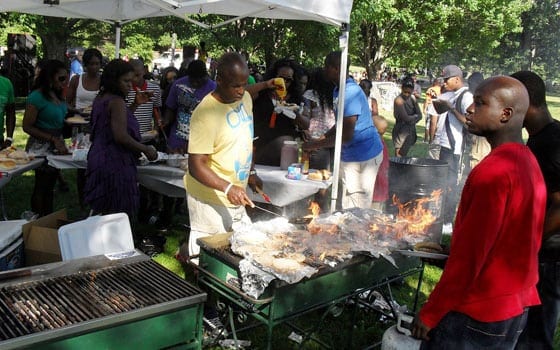

Author: Abdulrafiu LawalAdebayo Owolewa lent a helping hand at the 16th Nigerian Youth Organization Cookout while his younger brother, Adeoye Owolewa looked on.
Defying the scorching sun, Nigerian youth assembled at Franklin Playstead Park to mark the 16th Nigerian Youth Organization (NYO) cookout.
The annual cookout is an afternoon of food, fun and family-friendly activities to raise funds to support the organization’s work to educate and empower Boston’s Nigerian and Nigerian-American youth.
As they recited the Nigerian national anthem in unison, the pitch of their voices rose as they sang the concluding words:
“The labour of our heroes past shall never be in vain; To serve with heart and might, One nation bound in freedom, peace and unity.”
Olawunmi Akinwunmi, NYO executive director, says the annual cookout highlights the organization’s efforts to equip Nigerian youth with the knowledge, skills and resources they need to positively impact both Nigerian and American society.
“Today, in our midst we have lawyers, doctors, engineers and architects who have been part of this event right from their days in high school,” she said. “This is about continuity … Our parents were doing this for us some years back but now we are taking an active part in shaping our future.”
Founded in 1996, Nigerian Youth Organization of Boston is a nonprofit organization that encourages youth to develop their individual and cultural identities and use their talent and skills to achieve personal and professional prosperity.
Rahman Oladigbolu, the Nigerian founder Oracle Films International, was at the event to publicize his award-winning film, “Soul Sisters.” He described the cookout as a “wonderful experience.”
“I am seeing many Nigerian youth, most of them born in America, [taking adavantage of this] opportunity for us to connect and share our experiences for the betterment of our country,” he said.
Chikaelo Ibeabuchi, an NYO board member, explained that part of the driving force behind the group is the need for continuity as well as the need to appreciate the struggle of their parents.
“We want to excel and make our parents proud because many of them worked extra hard to give us the opportunity of being raised in America,” Ibeabuchi said. “Some had two or more jobs just to make us live a comfortable life.”
Cecilia DamaLizotte, a food vendor had another reason to attend the event. She came to sell “Suya,” a Nigerian delicacy.
Suya is made from beef with some spice and is the Nigerian equivalent of American barbeque.
“Each time I bring it, I always sell out,” she said. “It is a great inspiration for me because I am opening a Nigerian restaurant here in Boston in September known as Suyajoint. I have been doing it on part time basis, but now decided to go into it in full force. It will afford people the opportunity to eat good Nigerian food and mingle with others under an atmosphere of conviviality.”
The cookout was not immune from the American economic recession. NYO Treasurer Shola Muyide says one of the challenges confronting the organizers is lack of funds. According to him, it cost $5,000 to host the event every year but raising the funds for this year’s event was like squeezing water out of a stone.
“Some years back, parents and their children volunteered to help with organization, food and monetary donations but this year it took a last minute effort of some people to have this cookout,” he said. “Donations and volunteers are drying up which is not good for the future of this event. We need the support of parents to make this happen next year or else this tradition might die.”
Offiong Bassey, a Nigerian American singer, poet and producer, performed at the cookout and said it was like a family reunion. She held the youth spellbound for about 40 minutes as she rendered melodious songs.
“I wanted to share my gift with my people and my country,” she said. “Nigeria is part of my music. I am feeding the people that fed me I am giving back to the community.”
Bolade Owolewa, an assistant asset manager at MassHousing, has managed to hold SAT preparatory classes for Nigerian youth — despite her own tight personal schedule. She said there is no greater investment for a parent than investing in the future of their children through education.
“Sometimes,” she said. “I have to call parents to remind them to bring their children. But it is worth the trouble. It’s about their future and ours.”






